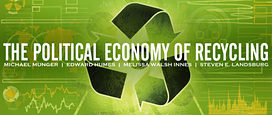Please note that as of this morning, we have enabled comments via the Disqus platform. Comments on this and all subsequent issues will remian open for 30 days following posting. All comments are subject to moderators’ approval, and the Editors reserve the right to delete comments that are threatening, harrassing, obscene, commercial in nature, or otherwise objectionable. Please direct questions about the comments to jkuznicki@cato.org.
Comments
Also from this issue
Editorial Note
Lead Essay
Michael C. Munger begins with the assertion that almost everything that’s said about recycling is wrong. Zero waste isn’t a good policy goal. Some things really do belong in the landfill. But which ones are they, and why? Munger offers a tour of the economics of trash burning, trash collection, landfill subsidies, and mandatory recycling. Along the way, he points out some of the irrational behaviors that flow from the “always recycle” message — irrational even when our highest priority is saving the environment.
Response Essays
Edward Humes argues that recycling is indeed economically efficient, and that pointing to occasional exceptions does not disprove the general rule. Still, he argues that recycling should be the last line of defense in our solid waste management strategy: Reductions in packaging, better incentives, and “pay as you throw” trash collection can all help solve the problem long before the recycling bin.
Melissa Walsh Innes argues in favor of “extended producer responsibility”—a public policy approach to solid waste that would assign landfill and other disposal costs to producers, not taxpayers. If this were done, corporations would seek out more efficient packaging, more comprehensive recycling methods, and other ways to economize on their use of disposal resources. Consumers would bear the costs in more expensive products, but only if they purchased the products in question. Consumers’ choices would drive producers to make market-based decisions that internalize and/or eliminate the externalities in question. Taxpayers would pay nothing extra, a key difference from many existing recycling programs.
Steven E. Landsburg argues that promoting recycling as a moral issue has a sinister cost: It encourages the public to view policy questions moralistically. When they do, they lose sight of tradeoffs, and the ability to compromise deserts them. If we absolutely must preach a morality, he says, let us preach the morality of respecting price signals. These will usually tell us when actions are efficient or inefficient. In short, we should encourage an ethos of respect for voluntary market outcomes.

